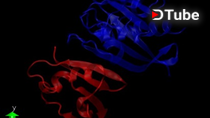Ras Oncoproteins
Oncoproteins are proteins whose mutations can lead to cancer. Ras proteins are a family of small-GTPases. The name Ras came from Rat-sarcoma (sarcoma is a kind of skin cancer. And Ras proteins were discovered first in rats around 1960s). Small-GTPases are enzymes (enzymes are bio-catalysts and catalysts accelerate reaction) which get activated when bound to GTP and inactive when bound to GDP. GTP and GDP are small molecule ligands. You must have heard of ATP (Adenosine tri-phosphate the energy currency molecules generated from mitochondria). GTP and GDP are Guanine analogs of ATP and ADP.

In the above figure (adapted from here) you can see GAP(GTPase activating protein), GEF(Guanine nucleotide exchange factor) proteins which modulate the activity of Ras protein. Ras is activated when it is bound to GTP and deactivated once the ligand GTP gets converted to GDP by hydrolysis( breaking the 3rd Phosphate group from GTP using water). The picture explains everything itself clearly. You can see that Ras acts as a molecular switch between ON(active) and OFF(active). That means there are predominantly two conformations of this proteins and GAP/GEF proteins modulate it using the GTP/GDP ligands.
There are mainly 3 main Ras protein isoforms are H-Ras, K-Ras, and N-Ras. Also, there are many Ras-like proteins like Rap, Rab proteins etc which has similar sequences and structures, but slightly different functions. This makes it really difficult to target using drugs.
Of all the cancers it is said to be at least 16% (most papers report 30% cases, but there is a 2012 paper saying that 30% is an overestimate) of cases is reported to be having mutations in Ras proteins. Mutations are errors in sequences. Like the amino-acid sequences of a regular(also represented as wild-type/WT) and mutant ones will have differences. Mutant protein can have a different amino acid in some site which may cause serious problems in the functioning of the protein itself.
What do active Ras do?
When Ras protein is 'switched ON', it activates other proteins in MAPK/ERK biochemical pathway, which ultimately turn on genes involved in:
- cell growth and cell proliferation,
- differentiation,
- survival etc
Now you can guess what can happen if Ras mutations go wrong. Cell growth and cell proliferation can go wrong, ultimately leading them to divide cells forever which can end up in tumors. The most common mutations found in Ras protein are at sites 12,13 and 61. And the result of these mutations is the Ras exists in ON state forever thereby signaling for cell division always.
MAPK/ERK PAthway

Reference to the above image : wiki
You can clearly spot Ras protein in the above figure.
From wikipedia :
The MAPK/ERK pathway (also known as the Ras-Raf-MEK-ERK pathway) is a chain of proteins in the cell that communicates a signal from a receptor on the surface of the cell to the DNA in the nucleus of the cell.
Ras proteins remain "undruggable"!
Despite a lot of research to find drugs to target Ras proteins, it still remains an open problem. Ras proteins are considered very "undruggable". Ref
What can Molecular Dynamics contribute here?
People have started using MD(molecular dynamics) simulations to investigate the dynamics of Ras proteins and Ras protein complexes. Ref One aim can be to find potential cavities in the protein so as to target that region using some small molecule. Doing MD simulations and finding out new potential candidates of drugs before real experiments can help the researchers to reduce the search space for candidate drug molecules and do the only necessary wet lab experiments.
Here is an MD simulation which I did for 10 nano second with Rap:Raf complex from 1C1Y protein data bank file.

In the coming articles, I will introduce the basic theory of classical MD simulations and how to perform one.
References:
https://www.ncbi.nlm.nih.gov/pmc/articles/PMC3354961/
https://www.ncbi.nlm.nih.gov/pubmed/25323927
https://www.ncbi.nlm.nih.gov/pubmed/25846136
Hi,
I am Devanand from Chennai, India. And my steemit handle is @dexterdev
Do you like my posts? Please do reply for your doubts etc. Also, Resteem and Upvote if you like these posts!
If you would like to see any improvements, please tell me.
Also, Follow me! :)
@originalworks